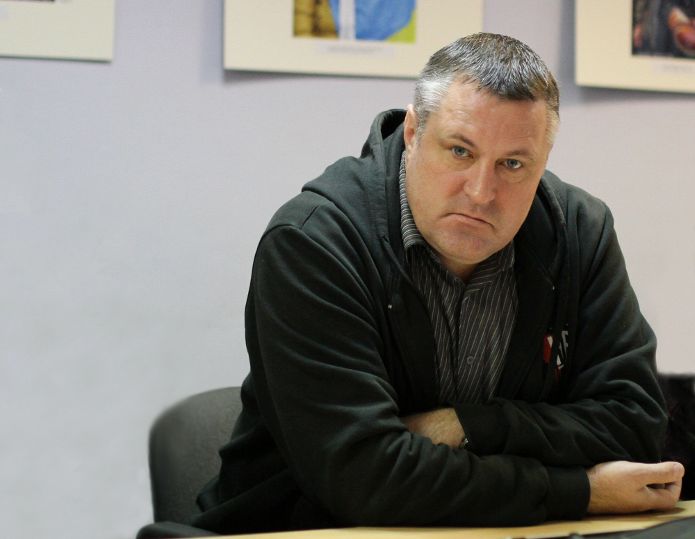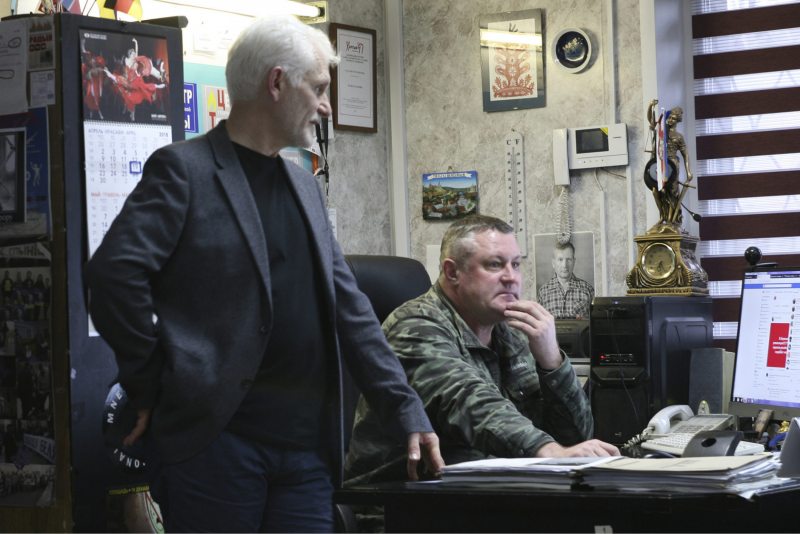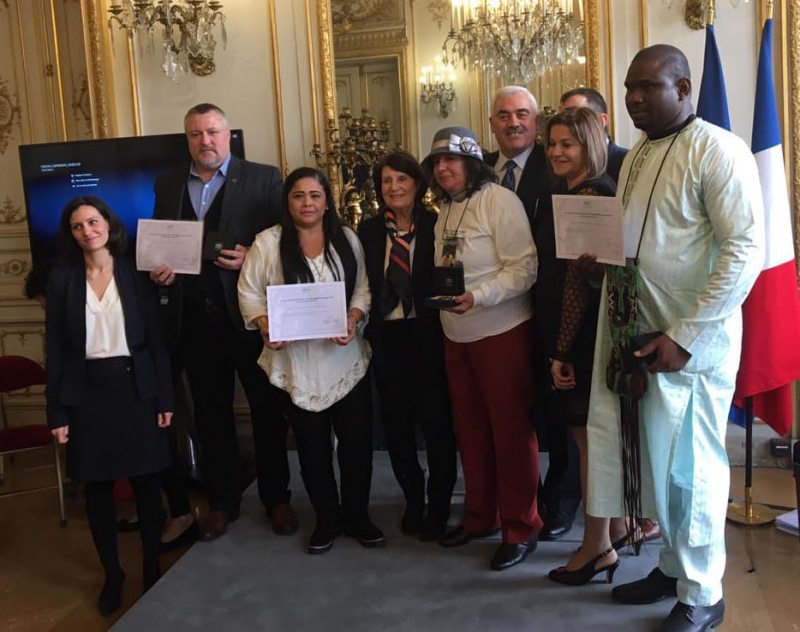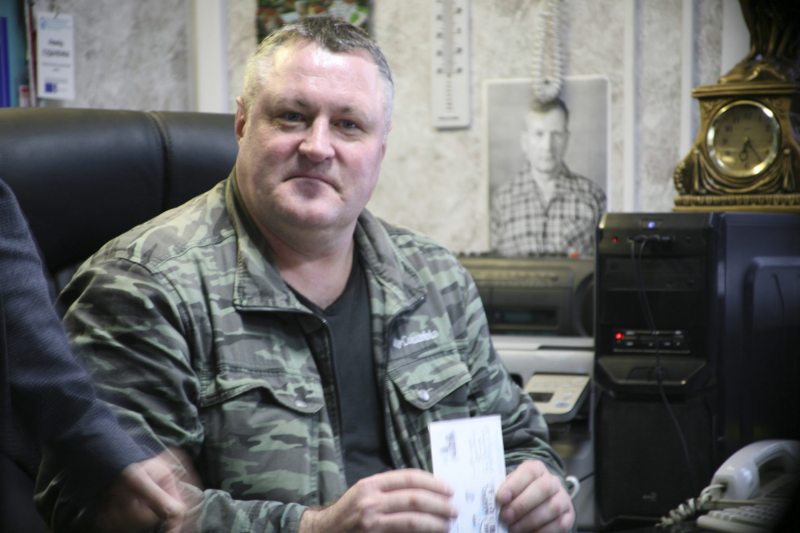Leanid Sudalenka: ‘It's not the state that gives us our rights’
Two weeks before Leanid Sudalenka, the head of the Viasna Homieĺ branch, was arrested Barys Zvozskau Belarusian Human Rights House published a large interview with him. How did Leanid go from a country boy to an internationally known human rights defender? What drove him in his advocacy for ordinary citizens? How many complaints has he made to the UN Human Rights Committee? Viasna publishes a translation of an interview taken by our colleagues.
"THE ULTIMATE DREAM OF VILLAGE SCHOOLBOYS"
– When I was a boy, I had no thoughts about a career in law. I studied at a village school, and the ultimate dream of village schoolboys was something like becoming a militiaman [‘militia’ – local police force]. That seemed a real wow – to be given some power… But primarily, a child living in a village was made ready for farming, so that they would stay where they were. I vividly remember the noticeboard at school with an appeal reading "All jobs are great, and you may choose whatever you like, whether it is milkmaid, farm machinery operator, tractor driver, or agronomist". Nobody proposed us to be bankers, lawyers, astronauts…
Those were the years when the country was building up communism. Nobody could have thought that, all of a sudden, there would be no workplaces in a village and that the level of life would go down. I remember well one of the Soviet leaders saying that, by 2000, every Soviet family would live in an individual flat. And I, a schoolboy, was sure that І would have to do nothing but wait until 2000. I made some calculations and realized that in 2000 I would be a very young man with a flat of his own, as promised from the TV screen. Great! Today, when I look back on 2000, I see myself but no flat at all…
Leanid Sudalenka says that his decision to live in Homieĺ was an occasional choice. Had he taken another decision, the prize of the French Republic would have gone to Mahilioŭ or Minsk:
– How did I get to the city… When I was a young man, villages began to die out. They offered no prospect for a full-quality life, job, and self-development. Most of the children living in villages were looking forward to moving away to towns and cities: Žlobin, Mazyr, Mahilioŭ… I don’t even know why I chose Homieĺ. Why not Minsk? Perhaps, it was because Homieĺ was closest to my village.
As for his going in for law, we should be thankful to his elder sister:
– I come from a large family and have four siblings; one of my elder sisters got a degree in law before I did. She worked at the Department of Justice in Homieĺ until she retired. So, it was, for the most part, my sister who had an impact on my choice. Frankly speaking, that was the only occupation I dreamed of. In fact, a rural school cannot boast a high quality of education. Plus this message about your being obliged to stay in your village… It was obvious that my level was not enough to be enrolled at a law school. That is why after finishing school, I completed a building-trade course at a vocational college. Before joining the army, I was employed by a woodworking enterprise in Novobelitsa and lived there at a boarding house. Then I was called up for military service.
"I SAW PEOPLE HAVING A DIFFERENT LIFE"
Leanid Sudalenka literally went as far as Berlin and even further west, reaching Magdeburg, because their military unit was seven kilometers from the West Germany border. He served two years in Germany and returned, as he claims, with a slightly different mentality as he saw what the world was like and how other people lived:
– It was difficult for an enlisted soldier spending 24 hours in a closed area to get to know the everyday life of ordinary Germans. But we were often taken to work in the city to help out; that is where we interacted with the Germans. The first time I tasted Pepsi-Cola was in Germany. Pepsi-Cola was something cosmic to me! If there was anything delivered to our village, it was mineral water and soda pop with syrup. I also tasted German beer in Germany and discovered the Gaststätte. These are private coffee shops or bars that almost every German has in his or her courtyard. And Soviet soldiers took to going AWOL, climbing over the fence to visit the nearest pub, although they risked being sent to the brig for that.
I saw people living in a different way. First, their clothing. In the Soviet Union, everyone wore the same clothes and shoes. I remember when I got married after the army, I had the problem of what shoes to wear to the wedding. Because in the shop, you could buy either sandals or rubber boots made by Trud factory, a manufacturer of special footwear. We were impressed to see how the Germans dressed, even though it was East Germany, not even West Germany. We were impressed by a large amount of food in the shops. We liked to buy milk and buns – all the food the soldiers miss. We were paid 36 Deutsche Marks: not much, but enough for milk, buns, and sweets. And without queueing!
The very atmosphere of life in Germany was impressive. Our unit was stationed on the outskirts of Magdeburg, and on weekends our soldiers were taken downtown, to a museum, for example. It was very striking that life in a German town was different from ours. In the USSR everything was grey, and people looked alike. While in Germany every person seemed an individual.
"THE LAW SCHOOL TRAINED STUDENTS TO BE MILITIAMEN, CUSTOMS OFFICERS, PROSECUTORS, JUDGES AND, POTENTIALLY, DEFENSE LAWYERS"
After serving in the army, Leanid Sudalenka returned to Homieĺ and enrolled in the law faculty of the Homieĺ University; he studied by correspondence, worked, and had no idea he would find himself engaged in the international human rights law:
– If they ever taught human rights at our law school, it was nothing but an optional course. As a university graduate, I knew nothing about human rights. The law school trained students to be militiamen, customs officers, prosecutors, judges, and, potentially, defense lawyers. I was an economics major, so after university, I went to work as a legal adviser at an enterprise. I was learning the hard way… At that time, I thought – I have a law degree and I'm already a lawyer; give me a case and I'll crack it wide open, I'll win in court! Now I know it is not like that; practice and experience are first and foremost. For the first five years after graduation, any lawyer is just a clerk. Knowing the law is not enough - you have to apply your knowledge in practice. As for human rights, I learned that elsewhere.
As I now understand it, a lawyer must, above all other things, uphold human rights values and adhere to international standards. After all, we see what happens in our courts. All – judges and lawyers alike – work without human rights training, acting solely within the framework of the national legislation. And what does the "framework of national legislation" mean? It means that when the law says that only dark-haired people have the right to peaceful assembly, then lawyers and judges stick to that saying, yes, this right is only granted to dark-haired people! And if you are blond, you don't stand a chance, so, rush to the hairdresser's to have your hair dyed; then maybe you will be given the authorization. But if we reflect on this issue from a human rights perspective, we all understand that, regardless of the color of your skin or where you were born, regardless of your religion or other elements of your identity, everyone has rights. It's not the state that gives it to us – our rights have been with us since birth.
"HOMIEĹ DEMOCRATS WERE MEETING IN PALESSKAYA STREET"
– I have worked for various enterprises as a legal adviser. Until I joined, shall we say, the democratic fold here, in Palesskaya Street in Homieĺ, I had worked with a hairdressing service company, and I am still their shareholder; everyone knows it in Homieĺ, it's called Lokon. At that time, I was handling the privatization of Lokon converting it into a joint-stock company – I was a licensed securities specialist, it was one of my related specializations, and I was authorized to work in the securities market. That's what I was doing at Lokon until one fine day in 2000 when I met Viktar Karniayenka. I helped my sister who was running for Parliament – I was in charge of her initiative group and collected signatures. I acted as an election observer and on the day of votes counting, I met Mikalai Novikau, a Homieĺ activist. It was him who told me that the Homieĺ democrats were meeting in Paliesskaja street and invited me to come and meet them. That's when Viktar Karniayenka, who played a significant role in my life, came along. He suggested I gave up what I was doing. He said, "Why do you need these dry cleaners, haircuts, and household services? Come and join us". I first tried combining jobs, both at the company and in Paliesskaja street, getting my bearings…
Leanid Sudalenka even ran for a member of Parliament himself:
– Twenty years ago, I believed that MPs could participate in public affairs, influence public policy, and address specific issues raised by the electorate… When I ran for Parliament in 2002, my program was mainly based on helping victims of Chernobyl. It seemed to me that the state was not paying enough attention to the problem.
"IT’S NOT THE STATE THAT GIVES US OUR RIGHTS"
– Before getting to know about human rights, I was a typical lawyer, always following the letter of law: if the law says it, that’s the way it is meant to be. It was only later, after I met the Homieĺ democrats, that I did an internship at the Helsinki Foundation for Human Rights in Warsaw and attended the Human Rights Summer School; and then I understood what human rights are. I understood where they originate from – understood that rights are not given to us by the state but belong to each of us from the moment we are born.
Unfortunately, when I was taking the Higher Courses on Human Rights in Warsaw, Marek Nowicki [Polish human rights activist, educator who founded the human rights courses in Warsaw under the Helsinki Foundation for Human Rights – author's note] had already died. For me, he remained just a legend. It was then that I began to realize that what I was studying at university and what I was learning in Warsaw were like night and day. There I understood that the proverb The law is harsh, but it is the law is about something which shouldn't be that way. Laws are written by human beings and human beings are prone to error. Just look at the so-called "Freeloading" Decree, which imposed taxes on the unemployed and was immediately canceled when people came out to protest. This is also the case with the Law "On mass gathering events", which in no way regulates the spontaneous gatherings that are now taking place. How can it be that when I walk through the city and see people in a column carrying flags and flowers, laughing and smiling, and decide to join this column, I must first ask, Hey, who is the organizer here? Did you get permission from the authorities 15 days in advance? Have you made arrangements with the police and the ambulance service? Why am I not entitled under this law to join the column? It sounds absurd because if I like it and want to join it, I should have the right to do it.
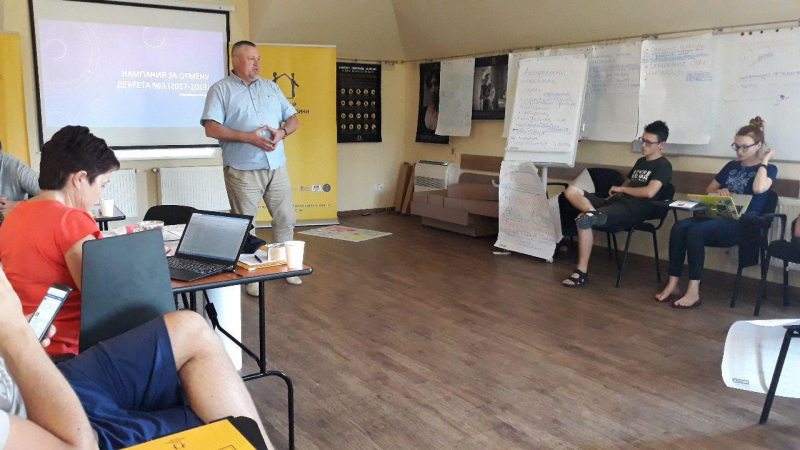
- Leanid Sudalenka speaks to the attendees of the BISH course. Čarnihaŭ Human Rights Educational House, Čarnihaŭ, 2019
The human rights defender says that the BISH course at the Belarusian Human Rights House also helped him get the gist of the international law:
– It helped me make out how to think through a line of legal reasoning, not only before national courts but primarily when drafting complaints to the UN Human Rights Committee. And I have a result, it seems to me: a total of 370 complaints from Belarus were registered by the Committee, one-third of that number being prepared on my PC, at my desk. About 150 individual appeals to the UN HRC are mine. Back in 2006, my colleagues and I established the Homieĺ Centre of Strategic Litigation and part of its work is our consistent efforts in preparing appeals to the HRC. We already have more than 50 cases on which the Committee has taken decisions to be enforced by Belarus; these are appeals in relation to a wide variety of rights violations, starting with the right to life. I, among others, proved in my case Sudalenka v. Belarus that the Republic of Belarus discriminated against me on political grounds during the election campaign.
Leanid Sudalenka does not rule out that, in the near future, the human rights defenders will demand the fulfillment of Belarus' international obligations from different representatives of the authorities, but his optimism is rather cautious:
– I don't think there will be a sharp turn towards democracy. There will probably be a transitional version. Of course, I would like to see a democrat coming to power and introducing an ombudsman institution immediately so that all legal mechanisms could function, the judicial system could finally be independent, and judges could issue decisions on their own without being guided over the phone what to do. If a violation of a right could be remedied within the national system, there would be no need to complain to the UN Human Rights Committee: you could go to court, resolve the conflict and there would be no problem… By the way, I believe that the citizens of the Republic of Belarus should be granted the right to appeal directly to the Constitutional Court. And it would be useful to introduce the institute of human-rights ombudsman to whom people could go if their rights were violated. But somehow it seems to me that even if the government in the country changes tomorrow, it won't be first-generation democrats. I think there will be a transformation process. Sooner or later, our country will come to have access to the European Court of Human Rights. I believe that, if that happens, preparing appeals to the ECHR will be my main activity. All the more so because, unlike the UN human rights system, the European Court contemplates the payment of monetary compensation. It's a way of making a living. I'm sure I could get a license to practice law if I needed to. In that Belarus where a lawyer will be truly independent, I will not be pressured for this license. Otherwise, look what happens: as soon as a presidential election is held, five to ten active lawyers lose their licenses. No one looks, as in Tamara Sidarenka's case, at her 35 years of legal practice: in the eyes of the committee, she, with all her experience, turned out to be "incompetent".
Speaking of his career path, Leanid Sudalenka recalls an attempt to obtain a license to practice law:
– Naturally, I failed to pass the exam. And never tried it again. When I was already involved, so to speak, with the Democrats, I thought that if I had been licensed, I would have gone to courts and defended my companions. However, in 2002 or 2003, during an exam at the Ministry of Justice, I encountered a very prejudiced attitude. I mean, examination questions can be asked in different ways; they can ask, "How many people died in the Great Patriotic War?", or they can ask you to name them all…
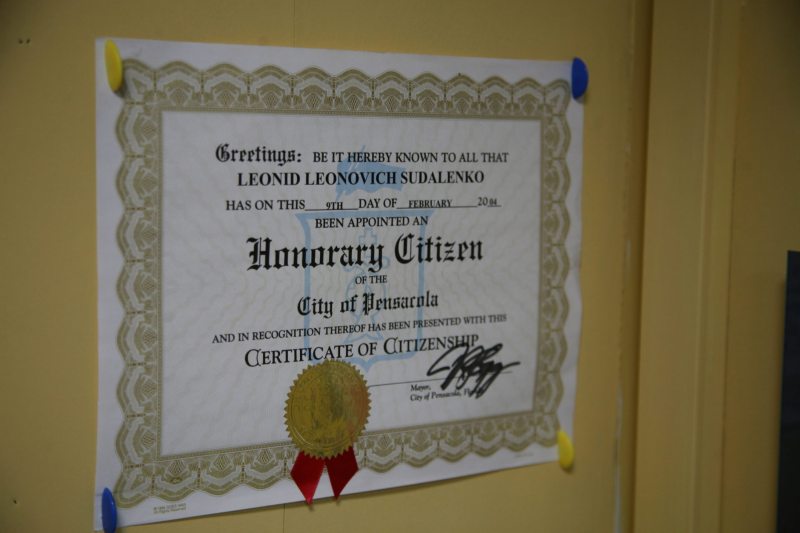
- Certificate of an Honorary Citizen of the City of Pensacola (Florida, US) awarded to Leanid Sudalenka
"BARYS WAS OBSESSED WITH HUMAN RIGHTS"
Apart from Viktar Karneyenka, Leanid names another person who had a powerful impact on his life and his path from lawyer to human rights activist – Barys Igaravich Zvozskau:
– We met somewhere in the 2000s when he came to Homieĺ to attend court proceedings against the Civic Initiatives, our Homieĺ civic organization. The authorities then launched a serious attack on freedom of association. At that time Barys Zvozskau was at the head of the Legal Initiative; he proposed we set up its branch in Homieĺ, we did it and had it registered, and I was elected chairman of the Homieĺ branch. Barys and I have been working closely together for a long time. Barys Zvozskau was also my teacher in the sphere of human rights. And when the Belarusian Human Rights House announced, for the first time, admission to the BISH educational course, Barys suggested I took it, and I gladly agreed. It is absolutely fair to say that the knowledge that I have now on the matters of human rights is the knowledge I got from Barys.
He was a humble man; he was humble with everyone. He was always ready to lend an ear, always coming to the rescue. He was an older friend you could turn to for advice… I was very close to him; I was, as they say, on short terms with him. I used to call on him for coffee; he always said, "Come and see me if you need to stay in Minsk". He took part in many trials. There was a high-profile case of Leonau, the Agriculture Minister, and Barys helped with that… He also visited the trials in Homieĺ. Barys was personally acquainted with Sergei Kovalyov, a Russian human rights activist; and at that time, when Kovalyov was still a member of the State Duma, Barys had a certificate as a deputy assistant, he was a deputy's assistant to Kovalyov.
Barys was obsessed with human rights, he lived it, it was the work of his lifetime. He was a real workaholic until his last day. The fact that the Human Rights House is named after Barys Zvozskau is a well-deserved honor. He had a radiant personality and a positive attitude. Such people leave a mark not only on other people but also on the country's history.
"THE LAWYER FOR FREELOADERS GOES TO PARIS"
France honored Leanid Sudalenka with the "Liberty, Equality, Fraternity" Prize for his opposing the "tax on idleness" – Decree No. 3 which established annual payments to be made by those "not employed in the economy". Supposedly, the Decree was intended to collect money from those who worked in other countries and did not show their earnings to the Belarusian tax office, but a very wide range of people got "caught in the crossfire", though, in the majority of cases, their unemployment was involuntary. Resenting their sudden status as freeloaders, people came out to protest all over Belarus. Leanid Sudalenka, who in addition to his human rights activities also works as a legal inspector for the independent REP Trade Union, announced his willingness to help anyone who wanted to fight against the unfair tax. In winter 2017, the entrance door of the office in Palesskaya Street was kept wide open: people were coming nonstop asking Leanid to appeal against the requirement to pay to the state for their unemployment. During those turbulent months, people started recognizing the human rights defender even outside the office.
– Paris. We all remember 2017 when the protests began. I helped everyone who came here to the Palesskaya office to write complaints. I was nicknamed by the authorities, somewhere on the internet, as a "lawyer for freeloaders". Under pressure from the protests, the authorities were forced first to suspend and then to amend Decree No. 3, and I had a hand in that too. When the editors of the Khartyia presented me with a human rights award in Warsaw, the former Belarusian ambassador to Poland said that it was due to me that Lukashenka canceled the Decree – because I had written too many complaints. This, of course, was an exaggeration. However, it was my activism regarding the "freeloading decree" that was noticed, for which reason I entered the competition held annually by France. The "Liberty, Equality, Fraternity" Prize is a government award, presented by the Minister of Justice for contribution to the defense of human rights. When I was filling in the application form, I had no idea that I would be one of those five elected out of 110 nominees. The five laureates represented five countries – China, Nigeria, Columbia… And me, coming from Belarus.
When the letter came by mail saying, "Congratulations, you have won the prize; you are invited to come to Paris on the Human Rights Day, where the Minister of Justice will award you", it was a shock for me! I am aware perfectly well of my role. For me, a provincial human rights activist from Homieĺ, this prize is something from a different world! My work has been noticed at such a high level. This is very inspiring. I wrote a letter back asking, "This is not a prank, is it for real?" And it was only when they requested for my passport details to be provided, booked my hotel and plane tickets, and sent me the program for the meeting, that I finally believed it was for real.
And then I got a call from the French embassy, the ambassador's assistant said that the ambassador was inviting me to a dinner party on the occasion of the award. The reception was at the ambassador's country house, and we went there with my human rights colleagues, who were also invited. It felt unreal. It felt cosmic… Honestly, it was only later that I started thinking why me, why not someone else, there are other candidates who are more worthy… Especially since I had been nominated for a Belarusian human rights award for five years in a row, never obtaining the award. I was shortlisted four times, but there was always someone else chosen to be awarded. However, that year, after the French prize, I got ours as well; I received it in 2019.
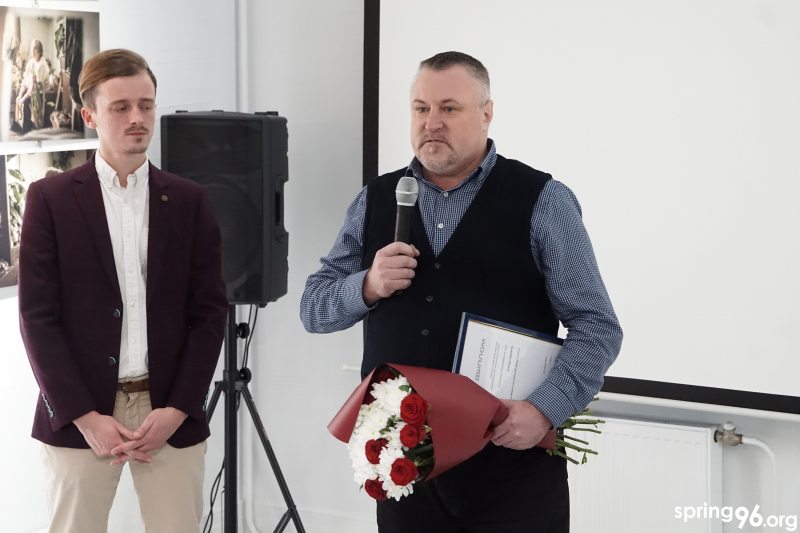
- Leanid Sudalenka obtains the National Human Rights Award. Minsk, 2019. Andrei Zavalei is to the left
The prize from France is valuable to me for yet another reason. When I received it in 2018, it was the 80th anniversary of the Universal Declaration of Human Rights, and on this memorable occasion, I was honored with the prestigious international award. The medal awarded to me is kept at home in a special place; when I look at it, I realize that my work is visible after all… There is much to be proud of. When I start telling my grandchildren about my life path, the medal will be evidence that I must have lived right. I am the first Belarusian to have received such an award. And Belarusian human rights defenders regularly receive international awards: Ales Byalyatski recently won the Alternative Nobel Prize in Stockholm; this was in recognition of the work that Belarusian human rights defenders are doing to reform the legal system around the world.
Leanid Sudalenka does not agree that throughout the years of his human rights activism he has been fighting an enemy that cannot be defeated:
– My work does bear fruit. As I have said, I am the author of a third of all appeals from Belarus registered and accepted for consideration by the UN Human Rights Committee, which is the result I can be proud of; this is what inspires me to continue working. It is clear that when you go to court and talk about human rights and a person in a judicial robe twists a finger at the temple, you feel like an alien from another planet. It is as if they wanted to say to me: here is the law, and you are telling us about some international covenants of some human rights… And it sometimes makes you feel frustrated. We are all lawyers and should speak the same language, but we are not heard in court. On the other hand, we are heard in international bodies, we are spoken to in the language of human rights standards, we are listened to, and decisions are taken. The existence of international mechanisms is therefore very important. I hope to live to see a time when we will be able to defend our rights before the European Court of Human Rights as well. I would go so far as to say that it will be the brightest day of my life.
"I ENJOY WORKING ON SUNDAYS"
– I love my job. I even come here at weekends. I enjoy working on a Sunday, sitting in silence, when there are no people in the office, and preparing, for example, an appeal to the UN HRC. Such work requires concentration… It is impossible to concentrate with the phone ringing all the time during the day, with people coming and going! Let me repeat it, my words about my work being a joy to me is not just a high-flown talk, it is just the way it is. My work makes me feel good, it is something I enjoy doing, it is my way to self-fulfillment.
Leanid Sudalenka was arrested on January 18, 2021. He was then remanded in custody and charged with "organizing actions that grossly violate public order" (Art. 342 of the Criminal Code), "training or other preparation of persons for such actions" and "financing these activities" (Part 2 of Art. 342 of the Criminal Code).
On November 3, Leanid Sudalenka was sentenced to three years in a medium-security penal colony.
Support Leanid by writing to him:Penal colony No. 3. 211322, Viciebsk region, Vićba (Belarus) Leanid Sudalenka (Леаніду Леанідавічу Судаленку) |



